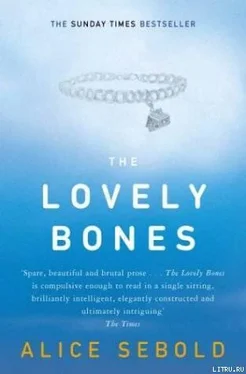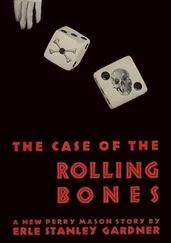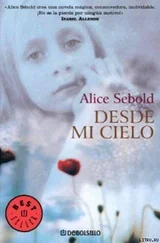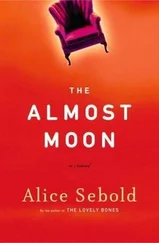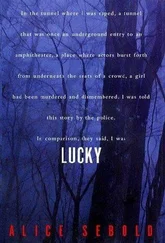My father was silent, but the line was riddled with his hesitation.
“I would like to make myself available to you and the children. I’ve been knocking around in this mausoleum long enough.”
“Lynn, we’re just beginning to start over again,” he stammered. Still, he couldn’t depend on Nate’s mother to watch Buckley forever. Four months after my mother left, her temporary absence was beginning to take on the feel of permanence.
My grandmother insisted. I watched her resist the remaining slug of vodka in her glass. “I will contain my drinking until” – she thought hard here – “after five o’clock, and,” she said, “what the hell, I’ll stop altogether if you should find it necessary.”
“Do you know what you’re saying?”
My grandmother felt a clarity from her phone hand down to her pump-encased feet. “Yes, I do. I think.”
It was only after he got off the phone that he let himself wonder, Where will we PUT her ?
It was obvious to everyone.
By December 1975, a year had passed since Mr. Harvey had packed his bags, but there was still no sign of him. For a while, until the tape dirtied or the paper tore, store owners kept a scratchy sketch of him taped to their windows. Lindsey and Samuel walked in the neighborhood or hung out at Hal’s bike shop. She wouldn’t go to the diner where the other kids went. The owner of the diner was a law and order man. He had blown up the sketch of George Harvey to twice its size and taped it to the front door. He willingly gave the grisly details to any customer who asked – young girl, cornfield, found only an elbow.
Finally Lindsey asked Hal to give her a ride to the police station. She wanted to know what exactly they were doing.
They bid farewell to Samuel at the bike shop and Hal gave Lindsey a ride through a wet December snow.
From the start, Lindsey’s youth and purpose had caught the police off guard. As more and more of them realized who she was, they gave her a wider and wider berth. Here was this girl, focused, mad, fifteen. Her breasts were perfect small cups, her legs gangly but curved, her eyes like flint and flower petals.
While Lindsey and Hal waited outside the captain’s office on a wooden bench, she thought she saw something across the room that she recognized. It was on Detective Fenerman’s desk and it stood out in the room because of its color. What her mother had always distinguished as Chinese red, a harsher red than rose red, it was the red of classic lipsticks, rarely found in nature. Our mother was proud of her ability to wear Chinese red, noting each time she tied a particular scarf around her neck that it was a color even Grandma Lynn dared not wear.
“Hal,” she said, every muscle tense as she stared at the increasingly familiar object on Fenerman’s desk.
“Yes.”
“Do you see that red cloth?”
“Yes.”
“Can you go and get it for me?”
When Hal looked at her, she said: “I think it’s my mother’s.”
As Hal stood to retrieve it, Len entered the squad room from behind where Lindsey sat. He tapped her on the shoulder just as he realized what Hal was doing. Lindsey and Detective Fenerman stared at each other.
“Why do you have my mother’s scarf?”
He stumbled. “She might have left it in my car one day.”
Lindsey stood and faced him. She was clear-eyed and driving fast toward the worst news yet. “What was she doing in your car?”
“Hello, Hal,” Len said.
Hal held the scarf in his hand. Lindsey grabbed it away, her voice growing angry. “Why do you have my mother’s scarf?”
And though Len was the detective, Hal saw it first – it arched over her like a rainbow – Prisma Color understanding. The way it happened in algebra class or English when my sister was the first person to figure out the sum of x or point out the double entendres to her peers. Hal put his hand on Lindsey’s shoulder to guide her. “We should go,” he said.
And later she cried out her disbelief to Samuel in the back room of the bike shop.
When my brother turned seven, he built a fort for me. It was something the two of us had said we would always do together and something my father could not bring himself to do. It reminded him too much of building the tent with the disappeared Mr. Harvey.
A family with five little girls had moved into Mr. Harvey’s house. Laughter traveled over into my father’s study from the built-in pool they had poured the spring after George Harvey ran. The sound of little girls – girls to spare.
The cruelty of it became like glass shattering in my father’s ears. In the spring of 1976, with my mother gone, he would shut the window of his den on even the hottest evenings to avoid the sound. He watched his solitary little boy in among the three pussy-willow bushes, talking to himself. Buckley had brought empty terracotta pots from the garage. He hauled the boot scraper out from where it lay forgotten at the side of the house. Anything to make walls for the fort. With the help of Samuel and Hal and Lindsey, he edged two huge boulders from the front of the driveway into the backyard. This was such an unexpected windfall that it prompted Samuel to ask, “How are you going to make a roof?”
And Buckley looked at him in wonder as Hal mentally scanned the contents of his bike shop and remembered two scrap sheets of corrugated tin he had leaning up against the back wall.
So one hot night my father looked down and didn’t see his son anymore. Buckley was nestled inside his fort. On his hands and knees, he would pull the terra-cotta pots in after him and then prop a board against them that reached almost up to the wavy roof. Just enough light came in to read by. Hal had obliged him and painted in big black spray paint letters KEEP OUT on one side of the plywood door.
Mostly he read the Avengers and the X-Men. He dreamed of being Wolverine, who had a skeleton made of the strongest metal in the universe and who could heal from any wound overnight. At the oddest moments he would think about me, miss my voice, wish I would come out from the house and pound on the roof of his fort and demand to be let in. Sometimes he wished Samuel and Lindsey hung out more or that my father would play with him as he once had. Play without that always-worried look underneath the smile, that desperate worry that surrounded everything now like an invisible force field. But my brother would not let himself miss my mother. He tunneled into stories where weak men changed into strong half-animals or used eye beams or magic hammers to power through steel or climb up the sides of skyscrapers. He was the Hulk when angry and Spidey the rest of the time. When he felt his heart hurt he turned into something stronger than a little boy, and he grew up this way. A heart that flashed from heart to stone, heart to stone. As I watched I thought of what Grandma Lynn liked to say when Lindsey and I rolled our eyes or grimaced behind her back. “Watch out what faces you make. You’ll freeze that way.”
One day, Buckley came home from the second grade with a story he’d written: “Once upon a time there was a kid named Billy. He liked to explore. He saw a hole and went inside but he never came out. The End.”
My father was too distracted to see anything in this. Mimicking my mother, he taped it to the fridge in the same place Buckley’s long-forgotten drawing of the Inbetween had been. But my brother knew something was wrong with his story. Knew it by how his teacher had reacted, doing a double take like they did in his comic books. He took the story down and brought it to my old room while Grandma Lynn was downstairs. He folded it into a tiny square and put it inside the now-empty insides of my four-poster bed.
On a hot day in the fall of 1976, Len Fenerman visited the large safety box in the evidence room. The bones of the neighborhood animals he had found in Mr. Harvey’s crawlspace were there, along with the lab confirmation of evidence of quicklime. He had supervised the investigation, but no matter how much they dug, or how deep, no other bones or bodies had been found on his property. The blood stain on the floor of his garage was my only calling card. Len had spent weeks, then months, poring over a xerox of the sketch Lindsey had stolen. He had led a team back into the field, and they had dug and then dug again. Finally they found an old Coke bottle at the opposite end of the field. There it was, a solid link: fingerprints matching Mr. Harvey’s prints, which were all over his house, and fingerprints matching those on my birth certificate. There was no question in his mind: Jack Salmon had been right from the beginning.
Читать дальше
